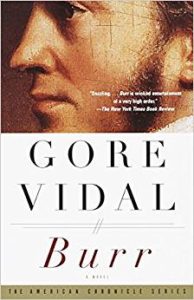Burr
by Gore Vidal
 Vidal is a master of his craft. This novel starts from the point of view of Charles Schuyler, a young law clerk working in the law office of an aged Aaron Burr. His employer inexplicably invites him on a mysterious carriage ride which ends in Burr’s wedding to a notorious rich widow. Schuyler, who prefers journalism to the law, writes an article about the wedding for a local newspaper–which gets rejected. But the editor, who is deep into New York and national politics, has an offer the penniless young man can’t refuse: a lucrative contract to write an anonymous pamphlet accusing Martin Van Buren (current vice-president and future presidential candidate) of being Aaron Burr’s illegitimate son which could hand the presidency to the likely contender Henry Clay. Schuyler just has to come up with some “proof” which, in those times before DNA testing, was pretty thin. This sets up the story in which young Schuyler struggles with his conscience over hurting a man he admires and helping a man, whose politics he abhors, win an election.
Vidal is a master of his craft. This novel starts from the point of view of Charles Schuyler, a young law clerk working in the law office of an aged Aaron Burr. His employer inexplicably invites him on a mysterious carriage ride which ends in Burr’s wedding to a notorious rich widow. Schuyler, who prefers journalism to the law, writes an article about the wedding for a local newspaper–which gets rejected. But the editor, who is deep into New York and national politics, has an offer the penniless young man can’t refuse: a lucrative contract to write an anonymous pamphlet accusing Martin Van Buren (current vice-president and future presidential candidate) of being Aaron Burr’s illegitimate son which could hand the presidency to the likely contender Henry Clay. Schuyler just has to come up with some “proof” which, in those times before DNA testing, was pretty thin. This sets up the story in which young Schuyler struggles with his conscience over hurting a man he admires and helping a man, whose politics he abhors, win an election.
Schuyler tries to get his evidence by interviewing Burr. Along the way, Burr decides to give Schuyler his notes for his own biography, setting up parallel stories: the end of Burr’s life as seen through the eyes of Charles Schuyler, and Burr’s youth and political career in Burr’s/Vidal’s own words. Of course Aaron Burr has a totally different slant on past events and characters than what we’ve been told in the history books. According to him, Washington was a dull man who never won a battle, Hamilton and Adams were monarchists, and Jefferson was the devil incarnate who did his best to enshrine slavery and states’ rights (the supremacy of a state to nullify any federal law and ultimately secede if they chose) into the federal system.
Vidal intersperses his colorful narrative with corrupt officials, political riots, a couple of murders and several affairs. In the background is the implication that our founding fathers were deeply flawed men and the early republic a fragile construction built on the evil compromise of slavery. The country could have easily broken apart at several times and in different configurations before the Civil War. Was the ugly moral compromise worth it? Vidal leaves it up to the reader to decide.
What I remembered of Aaron Burr before reading this novel: he killed Alexander Hamilton in a duel, fled to “the west” (of the Alleghenies), and beat a treason rap. I had forgotten he was vice-president during Jefferson’s first term and didn’t know he returned to an active political/social life in New York and lived to the ripe old age of eighty. I had thought he died in the west from the shame of killing one of our beloved founding fathers. (Hamilton wasn’t as beloved in his own time). I’ll definitely want to check out some biographies on this interesting and complicated man.
Vidal wrote a subtle, fascinating book about a misunderstood founding father. I highly recommend it. However, masters sometimes weave an error into the fabric of their creations, so the gods don’t get jealous of perfection. Vidal’s was an annoying tendency to describe Burr’s desk as “baize-covered” in every single scene in which it is mentioned (which were MANY). A tiny flaw, but it annoyed me. Overlook that minor annoyance and read the book.